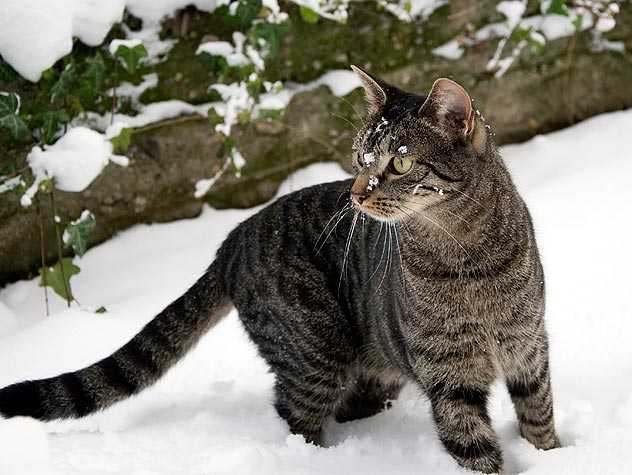Winter Care and Safety for Feral & Stray Cats

With snowy days just around the corner, you may be wondering how outdoor cats can survive in colder weather. Even though stray and community cats are at home outside, they can always use some extra help in cold or severe weather. Here are some tips to help them stay safe, warm and healthy during the winter months.
Car Safety: Before starting your car, give the hood a tap and check between the tires -- cats will sometimes crawl into the engine or hide underneath the car for warmth. This is also the time of year for antifreeze, which often tastes irresistible to cats and other animals, but is toxic and deadly. Keep it out of reach and clean up any spills!
Shelter: In the winter, shelter helps keep community cats comfortable. [see Petfinder staffer Sara's great homemade feral-cat shelters here]. Dog houses can also do the trick with a few modifications.
- Whether buying or building, make sure the shelter's door is no bigger than 6-8" wide to keep out other animals. If modifying a dog house, block off part of the door to make it cat-sized. A flap on the door will also keep snow, rain, and wind out.
- Insulate the shelter with straw to repel moisture and keep cats warm and dry (note: Make sure it's straw, but not hay, because hay absorbs moisture). Blankets may seem like a good idea, but since they are also extremely absorbent, they make bad bedding.
- Cats will huddle together inside for warmth, so shelters should fit three to five cats each.
- Elevate shelters off the ground and place them in quiet areas away from foot traffic.
- Remember to shovel out the cats when you're shoveling your own driveway. Cats in shelters can get snowed in, so keep entrances clear and shovel an exit for cats who may be taking refuge under bushes, porches, or other hiding spots.
- Stay away from salt and chemical melting products. These products can be toxic to animals and harmful to their natural snowshoes -- paws!
Food and water: When temperatures drop, provide extra food and water, and try to keep it from freezing. Other feeding tips:
- Feed the cats on a regular schedule. That way, the cats will know when to come around, and both the food and the cats will spend less time out in the cold.
- Feed wet food -- it's easier to digest, so cats save more energy for keeping warm. Since wet food is also quicker to freeze, make sure you put out dry food too. And feed larger portions than you would in warm weather.
- Spray insulation foam into the underside of plastic feeding dishes to keep wet food from becoming fishcicles! (Or chickencicles, turkeycicles, etc. ...)
- Change water bowls twice daily to keep water from freezing. Use deep bowls rather than wide ones, and refill them with hot or warm water. If the colony is close to an outlet, heated electric water bowls will also do the trick.
- Here's a trade secret: Add a pinch of sugar to the water to keep it from freezing as quickly (and to provide an energy boost for the cats!) [Read more tips to prevent freezing water for feral cats here.]
Thanks for looking out for the outdoor cats around you this winter.